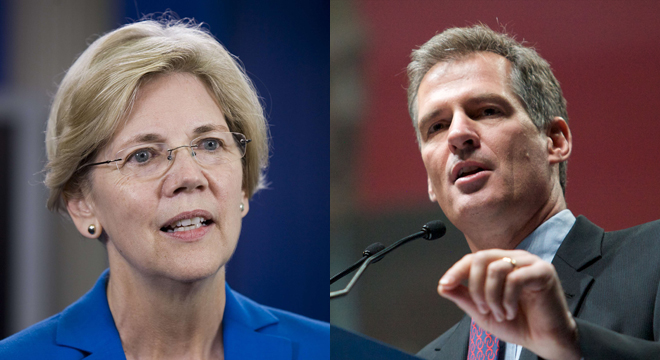Harvard law professor and consumer advocate Elizabeth Warren has had a busy September. She officially declared her run for the US Senate in Massachusetts, and quickly jumped to the front of the field in the state’s Democratic primary. A poll from Public Policy Polling (D) showed her instantly ahead, which may have panicked current Republican Senator Scott Brown. Now a second poll shows him up again, but by a statistically insignificant three points.
Brown registers 41 percent support against Warren’s 38 in a head-to-head matchup in a new poll sponsored by the Boston Herald and UMass-Lowell. The data also broke down support by types of ideology: general, fiscal and social. The numbers show that Warren is already leading with self-described liberals and moderates in terms of general and fiscal ideology, while Brown leads among general and fiscal conservatives, along with social moderates.
The poll also shows what Brown is up against in terms of the electoral makeup of the state. It’s no surprise that being a Republican in one of the bluest states in national politics was going to pose challenges, but Brown is viewed very favorably in the state: a majority of 52 percent view him in a positive light versus 29 percent the opposite. But the data shows that 63 percent of voters polled plan on voting in the Democratic primary, which both party enrollees and unaffiliated voters can participate in. That’s a lot of attention for Elizabeth Warren, who is far and way the leader in the primary with 36 percent of the total while six other candidates split only 19 percent among them.
Brown is still strong within the state because he maintains some support from independent and Democratic voters. He gets the nod from 48 percent of independents in the Herald/UMass poll and 16 percent of Democrats, while only 65 percent of people within her own party are ready to vote for Warren. But if she makes the sale to Democrats and Democratic leaners, there’s incredible opportunity to simply overwhelm Brown within the solidly blue state.
But Brown still maintains an edge: when asked whether he’s met voter expectations, 46 percent say that he had, combined with eight percent who say he’s exceeded them. By comparison, voters are more sour on President Obama who a full 54 percent of voters say has fallen short of expectations.
The poll used 1,005 live telephone interviews with registered Massachusetts voters conducted from September 22nd to the 28th. The survey has a sampling error of 3.8 percent.






